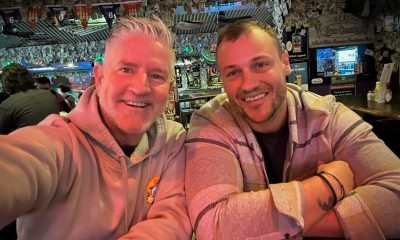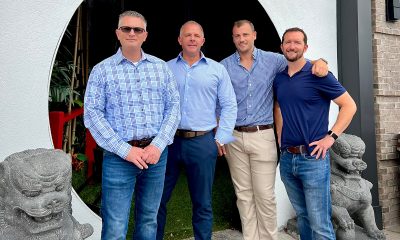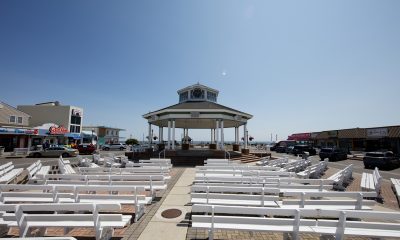Sports
Slugger’s journey to coming out
Former Orioles minor league all-star Tyler Townsend on life in baseball’s closet and finding redemption in helping others
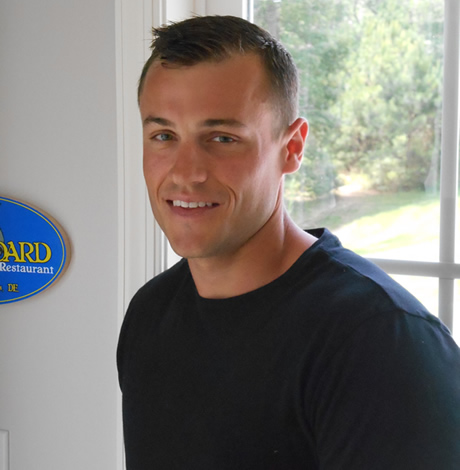
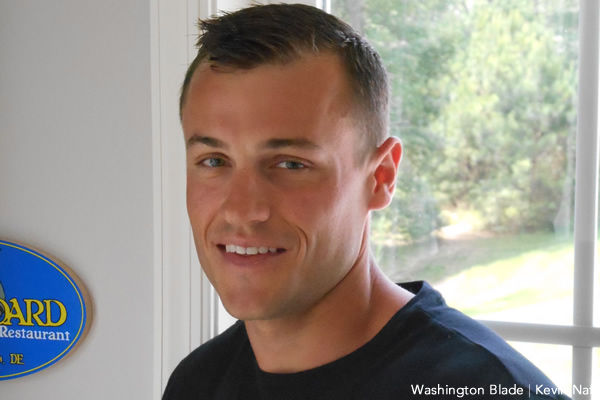
Today, Tyler Townsend has left baseball behind and is pursuing a degree in hospitality management. (Blade photo by Kevin Naff)
If not for a recurring hamstring injury, Tyler Townsend just might have become Major League Baseball’s first openly gay player.
Townsend, now 27, was drafted by the Baltimore Orioles in 2010 in the third round, opted out of his senior year at Florida International University and entered the minor league system.
An all-star first baseman, he quickly progressed through the system, playing stints in Aberdeen, Frederick and Salisbury, all within the Orioles operation. And through three years of minor league ball, Townsend played from the closet, keeping his sexual orientation a secret from teammates, coaches — and the female fans who followed the team and offered phone numbers to players.
“I was afraid of what would be said by teammates and fans,” he said in an interview with the Blade from his home in Rehoboth Beach, Del. “I always had a goal of getting to professional baseball since I realized I had the ability to do it and I just didn’t want anything to take away from that. I didn’t want the person who didn’t understand it to not give me a chance because they didn’t want to deal with my personal life. That was my fear. And there wasn’t anybody to look up to who was out playing sports.”
Despite his apprehension, Townsend said his plan all along was to delay coming out publicly until he made it to the big leagues.
“I would have come out if I’d made it to the pros,” he said, with a hint of regret.
For someone coming out publicly in the media for the first time, Townsend is relaxed and poised, reclining slightly in the well-appointed living room of the townhouse he shares with his partner not far from Rehoboth’s beaches.
His story rings familiar to legions of gay people who are — or were — out in their personal lives, but closeted at work. He had a boyfriend and lived in D.C. when not on the road, living an openly gay life, though he didn’t frequent gay bars. But when it was time to play ball, Townsend dodged questions about his sexual orientation — and why he never called those women who hit on him. His boyfriend at the time, who was older, attended games as his “uncle.”
“I was out in the off-season, so six months of the year I was happy and out and being myself and once spring training came around it was back in the closet,” he said. “I should have done things differently but I feel like telling this story now makes up for it a little bit.”
Townsend, like so many American boys, started playing baseball at age 10, joining a Delaware travel team and continuing through his high school years at Cape Henlopen High outside of Rehoboth, where he grew up. Rehoboth is a popular beach destination for gays from Baltimore, D.C. and Philadelphia, so Townsend was no stranger to the sight of two men holding hands.
“I always knew I was gay,” he said. “And growing up in Rehoboth, I knew what gay was. Once I realized I was attracted to other guys, I knew right away what it was.”
After earning a college scholarship and playing three years for Florida International, Townsend realized every little league player’s dream.
“To hear your name on TV on draft day is one of the best memories, it’s what I worked for my whole life,” he said. “Nothing else mattered.”
But the euphoria of that moment soon gave way to the harsh realities of a career in pro sports — long stints away from home, injuries and, for Townsend, the pressure of guarding his secret. After being drafted by the Orioles and signing his contract, Townsend played advanced rookie ball in Aberdeen, Md., then went to Pensacola, Fla., for training in the off season. That’s when he first tore his hamstring doing sprints, which led to continuous struggles with injury.
That’s also when he decided to start the coming out process by telling his family.
“I just couldn’t live with it anymore,” he said. “I thought the whole world was going to be against me. I couldn’t live with the lie anymore so I decided to tell my family and that was it.”
His family, which includes his mother of Lewes, Del., father of Georgetown, Del., a sister, half brother and half sister, proved supportive and accepting. “I was in Miami when I told my Dad and he got in the car and drove down to make sure I was OK.”
Locker room epithets
The acceptance he found off the field didn’t translate to the locker room, where homophobic epithets were commonplace and where he feared coming out would doom his chances of playing in the big leagues.
“So many times, I heard homophobic remarks in locker rooms but didn’t say anything because if I get to the position where they’re going to call me up and it’s between me and somebody else, I didn’t want the person making the decision saying, ‘I don’t want to deal with the publicity or the discomfort of other players,’” he said. “I didn’t want anything to hinder my chances and being openly gay would have hurt.”
He recalled one teammate who was religious and read the Bible every day, who told Townsend there’s nothing wrong with being gay as long as you don’t act on it. Another time, he said a coach called a player a faggot because he touched his belt. And at spring training in Florida, Townsend said an older gay man would often come to games and bring bubble gum and snacks for the players. On his birthday one year, the coaches joked about taking a video of the team in the shower and giving it to the man as a gift.
“Little things like that always made me realize there was no room for an openly gay player,” Townsend said. “If they’re that uncomfortable with the idea of someone being gay, what would their reaction be if they actually had to take a shower or change or play or trust someone on their team who’s gay?”
As a result, he never came out to anyone on the team, though one locker room incident brought him close. There was a man in North Carolina, Townsend said, who would sneak into locker rooms and impersonate cleaning staff while spying on players getting undressed. When someone finally caught on and kicked him out, the mood in the locker room turned angry, with players using anti-gay epithets and threatening to beat the man. According to Townsend, one player said, “I don’t care how close I am to somebody if I ever found out they were gay I would disown them.”
The threats of physical violence prompted Townsend to speak up, challenging his teammates, who demanded to know why he was defending the trespasser.
“I told them they were doing something stupid — it was the one time I spoke out,” he said. “People are ignorant and maybe it would have been different if I came out but I just felt that the majority of them had a preconceived notion of what all gay men are and it wouldn’t matter.”
After battling the hamstring injuries for most of his professional career, Townsend finally accepted that he needed a break in 2013.
“It was discouraging. It was one of the two toughest decisions I’ve had to make — leaving baseball and coming out.”
‘There’s still a lot of hatred’
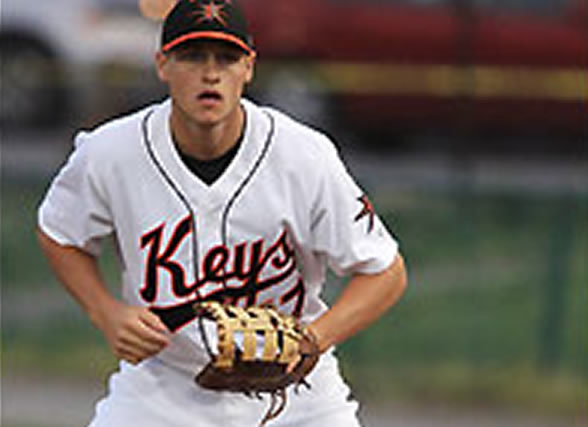
Tyler Townsend played in the minor league system after being drafted by the Baltimore Orioles in 2010. (Photo courtesy Frederick Keys)
Major League Baseball has never had an openly gay active player. The NBA had Jason Collins, who came out in 2013 and played briefly before retiring. The NFL had Michael Sam, who was drafted but failed to make a team and just last week quit the Canadian Football League, citing mental health issues. Publicly at least, Collins and Sam were heralded in the media and showered with attention — Oprah interviews, Sports Illustrated covers — all the trappings of a carefully orchestrated modern-day coming out story aimed at downplaying criticism and maximizing endorsement and speaking engagement potential. Anyone who tweeted their disgust with the newly out players was quickly reprimanded and the offending tweet deleted.
Just this week, David Denson, a minor league player with the Milwaukee Brewers system, came out as gay. He told the Milwaukee Journal Sentinel that his teammates on the Helena Brewers accept him. Maybe he’ll make it to the big leagues and become the first active out gay player, overcoming the skepticism of many observers who see baseball as the last frontier for gay athletes.
“Sports in general has that macho persona that you need to put out,” Townsend said. “Baseball is 85 percent players from conservative areas like Latin America and the Bible Belt and you have 18-year-old kids who’ve never been exposed to anything.”
The view that baseball will be the last major pro male team sport to have an out gay player is common among sports fans the Blade has spoken to about the subject. To help address the problem of homophobia in baseball, MLB hired gay retired player Billy Bean as its first “Ambassador of Inclusion.” Bean counseled Denson on coming out.
“The beauty of what could come from this is he can be an example that can help change that perception and change the stereotype that there would never be a gay person on a men’s professional sports team,” Bean told the Journal Sentinel. “That was something I struggled with.”
Townsend said he also turned to Bean for help with coming out publicly.
“Billy Bean has been a help, but he couldn’t come out either and it’s the same in 2010 as it was in the ‘80s,” he said. “ The locker room is a free-for-all, there’s still a lot of hatred and something needs to be done about it.”
So what’s to be done? Townsend cites sensitivity training for coaching staff as key, because younger players are emboldened when they hear coaches using homophobic epithets. The other solution, he says, is more out gays in the game. “We need someone like Jackie Robinson to break that barrier.”
Today, Townsend has mostly left baseball behind, though he recently played in a softball tournament. He’s resumed his studies at Florida International University, pursuing a degree in hospitality management. He works part-time as a bartender in Rehoboth and hopes to one day open a restaurant of his own.
He met his partner, David Gonce, a regional sales director for an information document managing company, about a year and a half ago in Dewey Beach, Del. The two exchanged glances at the Starboard, a bar and restaurant popular with the straight college crowd. But Gonce thought Townsend was checking out the female friend who was with him.
“I asked the waitress if he wanted to meet my buddy’s girlfriend and she said, ‘No, he’s gay and he’s looking at you.’”
They started dating shortly after and now, 18 months later, a plaque of the Starboard’s logo hangs in their living room.
“It’s got to be really difficult to suppress who you are in front of all these people you’ve gotten to know so well for such a long period of time playing baseball,” Gonce said. “I give him a lot of credit for doing that, it’s very difficult.”
Reflecting on his years in professional baseball and just how close he came to the majors, Townsend betrays some regret.
“It’s sad looking back now, I wish I could have been that person but I didn’t have the courage at the time,” he said. “That’s not right on my part … I would do it differently if I could. There’s that 16-year-old kid, I want him to know not to be scared and don’t let other people steer you away from who you are.”
He added that he’s still friends with some players on Facebook and isn’t sure how they’ll react to this interview but that he no longer cares.
“This is my way of letting the guilt go, so I’m doing this for me and for people who are struggling with the same things I struggled with to try to help them. My regret was not coming out sooner and being that role model for somebody but I still have the passion to help.”

More than a dozen LGBTQ athletes won medals at the Milan Cortina Winter Olympics that ended on Sunday.
Cayla Barnes, Hilary Knight, and Alex Carpenter are LGBTQ members of the U.S. women’s hockey team that won a gold medal after they defeated Canada in overtime. Knight the day before the Feb. 19 match proposed to her girlfriend, Brittany Bowe, an Olympic speed skater.
French ice dancer Guillaume Cizeron, who is gay, and his partner Laurence Fournier Beaudry won gold. American alpine skier Breezy Johnson, who is bisexual, won gold in the women’s downhill. Amber Glenn, who identifies as bisexual and pansexual, was part of the American figure skating team that won gold in the team event.
Swiss freestyle skier Mathilde Gremaud, who is in a relationship with Vali Höll, an Austrian mountain biker, won gold in women’s freeski slopestyle.
Bruce Mouat, who is the captain of the British curling team that won a silver medal, is gay. Six members of the Canadian women’s hockey team — Emily Clark, Erin Ambrose, Emerance Maschmeyer, Brianne Jenner, Laura Stacey, and Marie-Philip Poulin — that won silver are LGBTQ.
Swedish freestyle skier Sandra Naeslund, who is a lesbian, won a bronze medal in ski cross.
Belgian speed skater Tineke den Dulk, who is bisexual, was part of her country’s mixed 2000-meter relay that won bronze. Canadian ice dancer Paul Poirier, who is gay, and his partner, Piper Gilles, won bronze.
Laura Zimmermann, who is queer, is a member of the Swiss women’s hockey team that won bronze when they defeated Sweden.
Outsports.com notes all of the LGBTQ Olympians who competed at the games and who medaled.
Sports
US wins Olympic gold medal in women’s hockey
Team captain Hilary Knight proposed to girlfriend on Wednesday

The U.S. women’s hockey team on Thursday won a gold medal at the Milan Cortina Winter Olympics.
Team USA defeated Canada 2-1 in overtime. The game took place a day after Team USA captain Hilary Knight proposed to her girlfriend, Brittany Bowe, an Olympic speed skater.
Cayla Barnes and Alex Carpenter — Knight’s teammates — are also LGBTQ. They are among the more than 40 openly LGBTQ athletes who are competing in the games.
The Olympics will end on Sunday.
Sports
Attitude! French ice dancers nail ‘Vogue’ routine
Cizeron and Fournier Beaudry strike a pose in memorable Olympics performance

Madonna’s presence is being felt at the Olympic Games in Italy.
Guillaume Cizeron and his rhythm ice dancing partner Laurence Fournier Beaudry of France performed a flawless skate to Madonna’s “Vogue” and “Rescue Me” on Monday.
The duo scored an impressive 90.18 for their effort, the best score of the night.
“We’ve been working hard the whole season to get over 90, so it was nice to see the score on the screen,” Fournier Beaudry told Olympics.com. “But first of all, just coming out off the ice, we were very happy about what we delivered and the pleasure we had out there. With the energy of the crowd, it was really amazing.”
Watch the routine on YouTube here.
-

 Federal Government4 days ago
Federal Government4 days agoTwo very different views of the State of the Union
-

 Virginia5 days ago
Virginia5 days agoVa. activists preparing campaign in support of repealing marriage amendment
-

 Opinions4 days ago
Opinions4 days agoThe global cost of Trump’s foreign aid ideology
-

 Movies3 days ago
Movies3 days agoMoving doc ‘Come See Me’ is more than Oscar worthy

